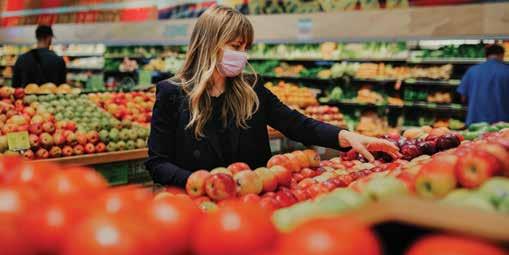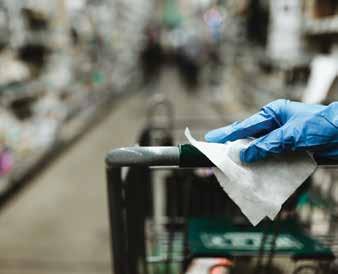
16 minute read
After an unprecedented year, where the grocery retail sector was recognised for the essential service it provides to Irish society, we face into an uncertain 2021. Retail Ireland
The Retail News Interview Facing the challenges head-on
After an unprecedented year, where the grocery retail sector was recognised for the essential service it provides to Irish society, we face into an uncertain 2021. Retail Ireland Chair Brian Donaldson and Director Arnold Dillon reflect on the year that was and the challenges facing Irish retail in 2021.
THE impact of the Covid-19 pandemic on Irish society cannot be over-stated. At the time of writing, we are still seeing infection levels of well over 1,000 per day, while the death toll from this insidious, invisible killer continues to rise daily. Who amongst us at the start of 2020 would have considered grocery retail the frontline in a battle against a global disease? And yet, grocery stores and their staff have continued to provide a vital service over the course of the Covid-19 pandemic, ensuring that the country remains supplied with food and drink, while practically every other sector has been shut down or had its activities severely curtailed. “It’s been a bit like a rollercoaster ride,” confesses Brian Donaldson, CEO of The Maxol Group and Chair of Retail Ireland. “When the pandemic started, nobody really knew what we were facing and there was genuine fear and anxiety amongst frontline retailers. The guidelines and the textbook had not been written as to how you set up a retail business to protect staff and customers. It really was a very uncertain, uncharted time and retail stepped up to the mark very quickly.” Within a space of just 72 hours, many retailers had formulated a plan of action to ensure stores were safe places to shop, investing in a host of protective measures like Perspex screens, signage and sanitise stations, as well as changing cleaning rotas, ensuring contactless payments, closing seating areas in-store, introducing limits on customer numbers in-store, and rigorously following the changes to guidelines and adhering to public health restrictions. “Retail can be proud of what it achieved within a very tight window,” Brian says, citing his own experience with Maxol, whereby the company established a “war office” as news of the pandemic hit, with management working

Retail can be proud of its response to the Covid-19 pandemic, as it stepped up to keep the country supplied.
18-hour days “to get our retailers through everything that they needed to do both in terms of compliance and best practice.” Maxol worked very closely with other retail groups, including BWG Food, Musgrave and the Henderson Group (in Northern Ireland), to make sure they were providing “100% accurate information and advice to retailers, and providing them the instore POS to relate that advice to customers”. “Essential retail has played a key part in keeping the nation going and in many ways following the first lockdown, the standards, disciplines and protocols that we established gave the Government the confidence to reopen all of retail and other sectors of the economy,” Brian summarises. “So I think retail can be proud of what it achieved in a very tight timeframe and has continued to deliver for almost 12 months.”
Covid in 2021
Brian believes that the position faced by retail in 2021 is a different one. “Where we are now is slightly different, because I think consumers have confidence that when they go into essential retail, they are going to be in a safe environment, because we are now in our third lockdown and we have done it successfully twice already.” “We have to make sure that we do everything right to protect our staff and our customers, and I think we are doing that,” Brian contends. “Nobody wants another 2020 again and the sooner we get through this latest lockdown and this latest spike in transmission, the better. Whilst we are still allowed to trade and we are grateful to be classified as essential retail, the vast majority of retailers on the high street remain closed; their wages are being paid by the Government and that doesn’t suit anybody. The concern for retail is that when things start to re-open and Government supports end, how many of those businesses will be able to trade?”
Changing consumer behaviour
The pandemic has changed consumer behaviour for good, the Retail Ireland Chair believes, and the growth in online shopping is a trend he expects to stick post-Covid, as the pandemic “accelerated the adoption of technology in retailing”. “Home delivery was always a tough sell for many supermarkets,” he admits. “But people have transitioned, initially through necessity and for reasons of safety but now, they are used to the convenience of home delivery and they like it. The same is true of click-and-collect, which was a slow-
Every business knows that for it to remain relevant and appealing to customers, there is a bigger demand, and a responsibility, on all of us to make sure we are doing the right things on renewable energy, and with things like recyclable and compostable packaging. This is a good thing, but it is going to add cost to business because doing the right thing isn’t always the cheapest option. ”
burn. I think people now realise that time is precious and they can see the value of services like click-and-collect or delivery. People now accept that technology has a big part to play. In fact, the use of technology is 2-3 years ahead of where it would have been if we hadn’t had Covid.” Another big change during the pandemic was consumers’ “greater solidarity with independent retailers who were there for them in a time of crisis. I think that has built and strengthened relationships,” Brian states. “All that we can hope is that the consumers who moved back to local, independent retailers will continue to support them in the days, weeks and months ahead.” The transition from office work to working remotely for huge swathes of the population brought opportunities as well as challenges for retailers. While community stores benefited from additional business, shops based in city centres or close to office blocks found themselves unusually quiet. “Genuinely, I think our ways of working are going to remain different,” says Brian. “I don’t see the concept of being in an office five days a week continuing, because many businesses realise that people can be much more effective working from home, not sending people into cities unless they really have to. I think there is going to be much smarter working, which will have an impact on the retail landscape. That is something many retailers are now looking at in terms of how their customer flows have been altered. “For those retailers, I don’t think their business will return to pre-Covid 19 levels, so they will have to adapt and look at how to make their business more attractive to those that are coming into those locations,” he continues. “But retailers are very good at that; they are very agile and good at seeing new opportunities on how to replace lost revenue and lost sales.” Government supports during the pandemic have been “hugely welcome and absolutely crucial”, from the PUP payment to the waivers on commercial rates. But the latter area is one that requires further attention, according to the Retail Ireland Chair: “This is an area where the Government and the County Councils that set rateable valuations on properties need to take account of what has happened over the last 12 months and to factor that into what our industry needs over the next five years.”
The Brexit challenge
Aside from Covid, the other huge logistical challenge affecting Ireland is the United Kingdom leaving the European Union and the prolonged negotiations that took place throughout 2020. The last-minute deal, while welcome, meant that businesses didn’t have a lot of time to get to grips with the new regulations, which have led to delays and supply chain issues at the beginning of 2021, particularly in Northern Ireland. “There are more difficulties for Northern Ireland retailers than for those in the Republic and that comes down to supply chain. I think UK retailers and businesses were not prepared and were caught off guard,” Brian contends, while confirming that they have seen a big difference in preparedness between British and Irish suppliers. He is confident that as all stakeholders get used to the new regulations and what is required, these problems will resolve themselves fairly quickly. The issue whereby certain

I don’t see the concept of being in an office five days a week continuing, because many businesses realise that people can be much more effective working from home, not sending people into cities unless they really have to. I think there is going to be much smarter working, which will have an impact on the retail landscape. ”
Brian Donaldson, Retail Ireland Chair and CEO of The Maxol Group: “Retailers are resilient, and we have already seen them adapt through technology and new services such as click-andcollect, so I remain confident retail will continue to evolve and play an important role in the recovery of the economy.”

The use of technology is 2-3 years ahead of where it would have been if the Covid-19 pandemic hadn’t happened, according to Brian Donaldson.
products travel through multiple jurisdictions, such as an ingredient sourced from the EU, processed in Britain and then imported into Ireland, still has a substantial amount of red tape and paperwork to negotiate, however. Retail Ireland Director, Arnold Dillon, believes that the issues around product origin will “have an impact on how suppliers, producers and retailers operate, whereby the model that a lot of companies have used, where they treat the UK as a distribution hub for Ireland, will change, and will lead to a fundamental re-think in terms of organising supply chains.” Arnold also believes that there is a risk that additional costs could be borne by consumers, but “the hope is that given the highly competitive market, that the supply chains will overcome some of these challenges.”
Labour costs
There are a host of other issues facing retailers that have been with us for a long time and will still be there, when the more immediate concerns of Brexit and Covid have hopefully retreated. The issue of high business costs, including labour costs and insurance premiums, will still be there when the dust settles. “Retail is a challenging business. One of the very few variable overheads you have is your wage cost,” Brian admits. “We have seen the minimum wage continually rise every year, which is a challenge for retail as that has to be funded. In some cases, if you are not getting revenue growth, those increases lead to job losses rather than job creation.” However, the Retail Ireland Chair is cognisant of the fact that retail staff are critical to “the level of service you provide and the type of offer you make to consumers”, so retailers continue to invest in their greatest asset. To that end, Retail Ireland has worked on an apprenticeship scheme via the Retail Ireland Skillnet, to ensure that retail is a career rather than just a job. One area Retail Ireland is keen to explore via apprenticeships is retraining for those staff members whose role may no longer be required in the future, as technology like AI impacts on the shopfloor. “What we are trying to do as an industry body is to make sure that people in retail can be re-trained so they can remain in retail, albeit in a different role, whether that is in the technology side, customer liaison roles or category management roles, areas that are evolving,” Brian explains.
Insurance reform
The thorny issue of insurance reform is never far from retailers’ thoughts and both the Director and Chair of Retail Ireland believe that real progress needs to be made in this area during 2021. “The size of the claims is still the biggest issue,” Arnold says. “Government has promised significant action on that. We are hopeful that reviews are currently in place around awards and that reform will bring Ireland back into line with other countries, because the awards here are often multiples of what you get in other jurisdictions. Change has been required on this for years and hopefully we will see it this year.” Brian explains that despite huge investment by retailers in areas like CCTV, staff training, risk assessment etc, it has not led to a reduction in insurance premiums, but the retail group is in constant communication with Tánaiste and Minister for Enterprise, Trade and Employment, Leo Varadkar TD. “He is leading the reform of insurance and has given us a commitment that he is going to make it top of his agenda,” Brian explains. “I fully appreciate that Covid and Brexit have been a real distraction and I am confident that he will drive the reform agenda this year.”

Arnold Dillon, Retail Ireland Director: “An awful lot of incredible work is already being done by individual retailers in terms of sustainability and it is what consumers want and what consumers expect.”
The Covid-19 pandemic has changed some Irish shopping habits for good.

Sustainability and the environment
The issue of sustainability is also top of retailers’ agendas moving forward. A few years ago, some people were paying lip service to the issue of climate change, but now it has become firmly embedded in company culture, because it is being driven by consumers. “Every business knows that for it to remain relevant and appealing to customers, there is a bigger demand, and a responsibility, on all of us to make sure we are doing the right things on renewable energy, and with things like recyclable and compostable packaging,” Brian agrees. “This is a good thing, but it is going to add cost to business because doing the right thing isn’t always the cheapest option. But as an industry, we have to move forward for the right reasons and consumers will have to accept that on certain products they may end up paying a little bit more, but I believe there is a willingness amongst consumers to do that.” Arnold acknowledges that the sustainability agenda may not have been to the fore over the last year, as the immediate threats of Covid and Brexit took precedence, but “as we move through this crisis, all of the issues around sustainability and packaging will return. It is going to be about getting the incentives right for consumers and for business. An awful lot of incredible work is already being done by individual retailers in terms of sustainability and it is what consumers want and what consumers expect.” Brian explains that his own company, The Maxol Group, now measures its carbon footprint across every aspect of the business, from site level to supply chain and head office. “It’s not inexpensive,” he admits, revealing that The Maxol Group is working with KPMG on a structure to measure and make significant progress on sustainability. “It takes money, time, resources and people, but unless you are doing it now, you will become obsolete to customers very quickly.”
The energy revolution
As a fuel retailer, Maxol is also at the coalface of the energy revolution in terms of how we power our vehicles. The Group recently unveiled an extensive carbon offsetting programme, and it has also been to the fore in terms of electric vehicle charging points on forecourts. “Everyone now realises across the world that governments are backing electricity as the next energy for mobility, or for a large part of it,” Brian admits. “By 2050, we are looking at having zero greenhouse emissions around the globe. Ireland is talking about banning new sales of vehicles with internal combustion engines that run on petrol or diesel by 2030. So, there will be an accelerated shift to electric vehicles within the next 10 years, which will probably be full plug-in. “The real inflection point, when things really start to change, is probably going to be around the mid-point of this decade,” he continues. “At the moment, people are a little uncertain what to do, whether to stick with a petrol or diesel car. In 2020, 45% of new car sales were still diesel engines, over 30% were petrol engines. These cars all have a life expectancy of 12-13 years in Ireland so there’s still going to be a lot of internal combustion engine vehicles on the road post-2030. Beyond that, you are probably looking at electric vehicles being in the majority and you are probably looking at hydrogen powering the majority of HGVs, road trucks, transport and trade vehicles.” In the meantime, forecourt retailers are trying “to plan to be able to provide energy formats at the right time and the right cost”, as Brian explains: “At this point in time, there is no business case to support a huge move to electric because by the time the electric vehicle fleet gets to a certain size, today’s equipment will be redundant and out-of-date because technology is moving at such a pace. But this is something that is going to impact on every fuel retailer across the globe within this decade.”
Consumer confidence
As we move forward through 2021, Brian believes that there will be a sharp increase in consumer spending once restrictions are eased, but he is less optimistic about the longer-term outlook. “When we come out of this lockdown and a certain percentage of the population are vaccinated, I think we will see pent-up demand spike and then we might see that level out again.” he says. “Unfortunately, in the wider economy businesses will close and job losses will start to build, as we get into what could be a difficult trading environment and a tough economy across so many levels. In our sector, retailers are resilient, and we have already seen them adapt through technology and new services such as click-and-collect, so I remain confident retail will continue to evolve and play an important role in the recovery of the economy.” Arnold is slightly more optimistic in his outlook: “Ireland is in a better position than a lot of other countries in terms of the macro-economic situation so the hope is that, while there are enormous challenges in the medium term, if we do get a proper re-opening of the economy at large, then retail will be in a position to benefit from any lift in consumer confidence. There have been very high savings rates, so that is a lot of untapped potential and if we can find the right incentives and restore confidence, there is a hope that we will get a strong rebound. The real risk in the immediate term is to ensure that retail businesses survive this current phase. Hopefully, the Government supports that are there are sufficient to help keep those businesses alive until we get to the point where we can see a proper recovery.”













